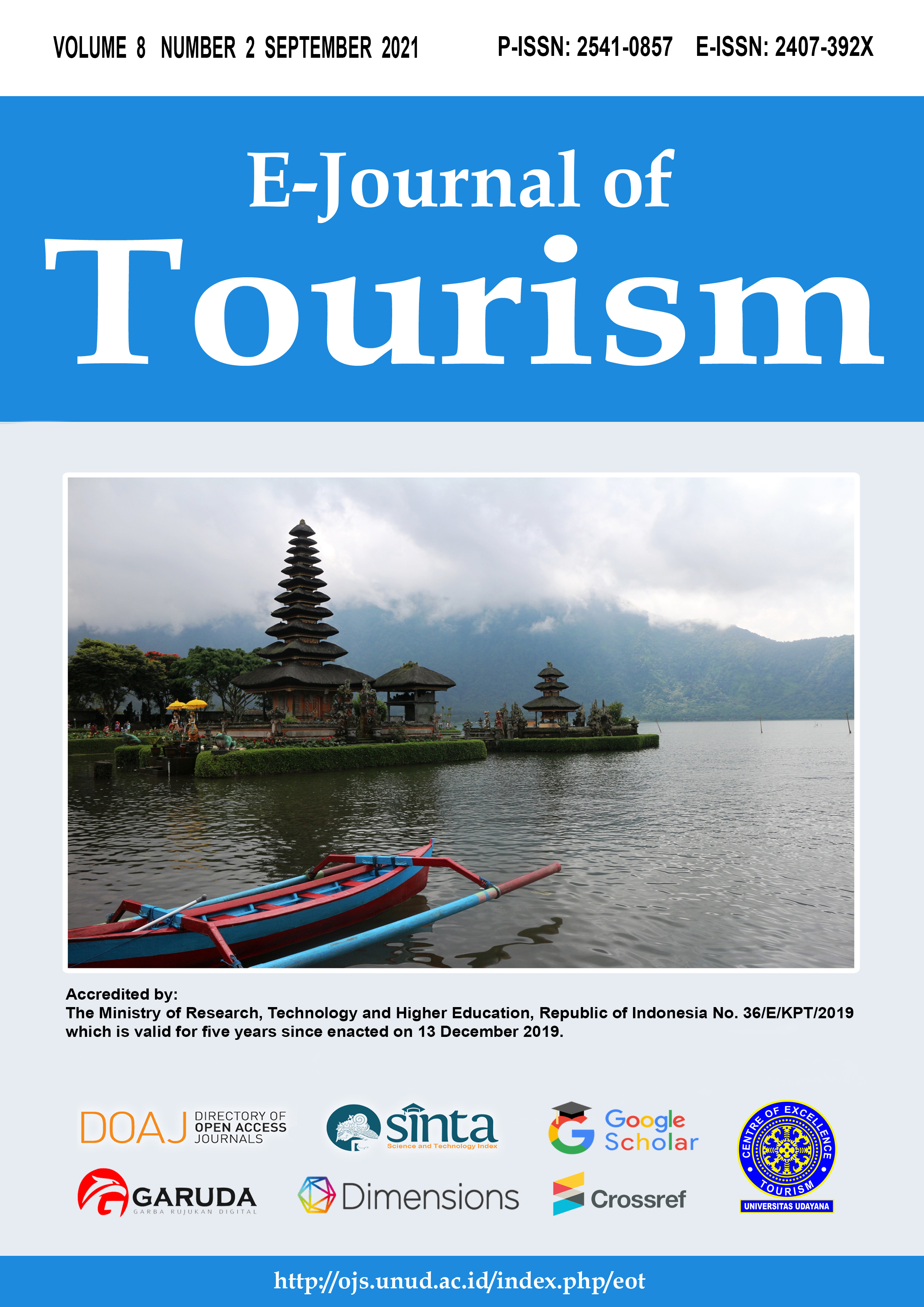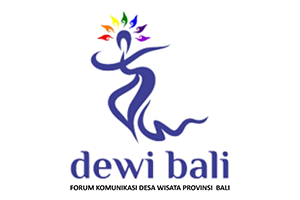A Conceptual Human Resource Strategy Framework for Rural Tourism After Covid-19 Pandemic: Case Study in Sukajadi Village, Bogor District, Province of West Java
Abstract
The Covid-19 pandemic demands that all industries adapt quickly, and the tourism industry is no exception. Tourism as an industry that contributes significantly to a country’s GDP must be able to respond to changes in tourist interest. Tourism village is one of Indonesia’s tourism potentials and has a big influence on economic development. However, the level of awareness of village community tourism in Indonesia is still lacking. The stigma that the production process only comes from the agricultural production process is still very much attached. The purpose of the study was to find out how the conceptual framework of the Human Resources (HR) development strategy in the tourist village of Sukajadi, Bogor Regency, West Java, after the Covid-19 pandemic. The research method used is a qualitative approach with Soft System Methodology (SSM) analysis tools with expert respondents who are included in the tourism village stakeholders. This study produces a conceptual framework for the human resource development strategy of Sukajadi Tourism Village, which is integrative and holistic in nature to form an HR management system. Results show that, three strategies for developing human resources in tourist villages were found to increase the capacity of human resources in tourist villages. These strategies include a policy strategy for developing tourism village communities and tourism awareness groups, a strategy for standardizing MSME products, and an approach strategy for tourism awareness groups and institutions.
Downloads
References
Dessler, Garry. 2013. Human Resource Management – Thirteenth Edition. New Jersey: Prentice Hall.
Dewi, M. H. U., Fandeli, C., & Baiquni, M. 2013. Pengembangan Desa Wisata Berbasis Masyarakat Lokal Di Desa Wisata Jatihluwih Tabanan, Bali. Kawistara,3(2): 117-226.
Evans, Nigel, David Campbell & George Stonehouse. 2003. Strategic Management for Travel and Tourism. Oxford: Butterworth-Heinemann
Febriyani, N., Suryawardani, B., Prodi, D., Pemasaran, M., Terapan, F. I., & Email, U. T. (2020). Pengaruh Brand Personality Terhadap Minat Menginap Di Hotel Utc Bandung Tahun 2020 the Effect of Brand Personality on Intention of Staying At the Utc Hotel Bandung 2020. 6(2), 2792–2799.
Govand Anwar, N. N. A. (2021). The Impact of Human Resource Practice on Organizational Performance. International Journal of Engineering, Business and Management (IJEBM), 5(01), 35–47. https://doi.org/https://dx.doi.org/10.22161/ijebm.5.1 Article
Hwang, D., Stewart, W., & Ko, D.-W. (2012). Community Behavior and Sustainable Rural Tourism Development ENVISION-An inclusive approach to assessing integrative scenarios and visions for protected area management View project place-based conservation: perspectives from the social sciences View project. Article in Journal of Travel Research. https://doi.org/10.1177/0047287511410350
Jusmaliani M.E. (2011). Pengelolaan Sumber Daya Insani. Bumi Aksara.
Kotler dan Gary Amstrong. (2016). Dasar-dasar Pemasaran.Jilid 1, Edisi Kesembilan.Jakarta: Erlangga. p125
Lane, B., & Kastenholz, E. (2015). Journal of Sustainable Tourism Rural tourism: the evolution of practice and research approaches-towards a new generation concept? https://doi.org/10.1080/09669582.2015.1083997
Martin, E. 2008. Aplikasi metodologi sistem lunak untuk pengelolaan kawasan hutan rawan konflik: kasus hutan penelitian Benakat, Sumatera Selatan. [Disertasi]. Bogor (ID): Institut Pertanian Bogor.
Noe, R. A, Hollenbeck, J. R., Gerhart, B. & Wright, P. M. (2006). Human Resources Management: Gaining ACompetitive Advantage.5th Ed. New York: McGraw-Hill/Irwin.
Patel, N. V. 1995. Application of soft systems methodology to the real-world process of teaching and learning. International Journal of Educational Management, 9(1), 13-23.
Pujiono, A., Setyawati, R., & Idris, I. (2018). Strategi Pengembangan Umkm Halal Di Jawa Tengah Dalam Menghadapi Persaingan Global. Indonesia Journal of Halal, 1(1), 1. https://doi.org/10.14710/halal.v1i1.3109
Rodríguez-Antón, J. M., & Alonso-Almeida, M. D. M. (2020). COVID-19 impacts and recovery strategies: The case of the hospitality industry in Spain. Sustainability (Switzerland), 12(20), 1–17. https://doi.org/10.3390/su12208599
Roger, S. Pressman, Ph.D. 2012. Rekayasa Perangkat Lunak (Pendekatan Praktisi) Edisi 7 : Buku 1. Yogyakarta (ID): Andi.
Rowley, C., Bae, J., Horak, S., & Bacouel-Jentjens, S. (2017). The International Journal of Human Resource Management Distinctiveness of human resource management in the Asia Pacific region: typologies and levels. The International Journal of Human Resource Management, 28(10), 1393–1408. https://doi.org/10.1080/09585192.2016.1189151
Saxena, G., Clark, G., Oliver, T., & Ilbery, B. (n.d.). Conceptualising Integrated Rural Tourism.
Setiawan, I. R. (2016). Pengembangan Sumber Daya Manusia di Bidang Pariwisata: Perspektif Potensi Wisata Daerah Berkembang. Jurnal Penelitian Manajemen Terapan, 1(1), 23–35. https://journal.stieken.ac.id/index.php/penataran/article/view/301
Sihite, J., & Nugroho, A. (2018). Exploring the Indonesian Tourism Destination via Indonesia.Travel @indtravel. 52(Ictgtd), 29–32. https://doi.org/10.2991/ictgtd-18.2018.4
Sinn, J. S. (1998). A comparison of interactive planning and soft systems methodology: enhancing the complementarist position. Systemic Practice and Action Research, 11 (4), 435–453.
Suryawardani, I. G. A. O., & Wiranatha, A. S. (2017). Digital Marketing in Promoting Events and Festivities. a Case of Sanur Village Festival. Journal of Business on Hospitality and Tourism, 2(1), 159. https://doi.org/10.22334/jbhost.v2i1.51
World Economic Forum. 2019. Travel and Tourism Competitiveness Index Report. Diunduh 20 November 2019, from World Tourism Organization Website: www.wto.org

This work is licensed under a Creative Commons Attribution 4.0 International License.
The copyright of the received article shall be assigned to the journal as the publisher of the journal. The intended copyright includes the right to publish the article in various forms (including reprints). The journal maintains the publishing rights to the published articles.




















